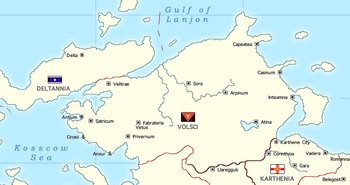Volsci
Volsci Republic | |
|---|---|
|
Flag | |
| Anthem: "The Song of the Volscians" | |
 Location of Volsci | |
| Status | Independent State |
| Capital | Antium |
| Official languages | Sabellic |
| Demonym(s) | Volscian |
| Government | Unitary parliamentary republic |
| Legislature | Parliament |
| Population | |
• 2018 census | 146,520,000 |
| Gini (2017) | medium |
| HDI (2017) | medium |
| Date format | dd/mm/yyyy |
| Driving side | right |
The Volsci, short for the Volsci Republic, is a nation on Eurth. Situated in northern Europa, it is bordered by Deltannia to the north-west, Vetok to the south-west, and Karthenia and Paranoid Schizo to the south-east. Historically, they were among the most dangerous enemies of ancient Arhome.
Etymology
Most modern etymologists regard the tribal name Uolscae as being related to Pynglish: gwalch (hawk); perhaps related on the Proto-Indo-Europan level to East-Arhoman falco (hawk).
Compare the Volscian personal name Catolcus to Pynglish cadwalch ('hero' or 'battle-hawk'), though some prefer to translate Sabellic *uolco- as 'wolf' and, by semantic extension, 'errant warrior'.
Geography
The Volscian territory is situated in the northern edge of the Europan continent. The area extends from the Kosscow sea in the west, to the Gulf of Lanjon in the north, and the Oriental Ocean in the west. It includes some islands in the north and east. Lake Kitezh in the southeast is the largest lake in the nation. Some of the major cities include: Antium (capital), Anxur (seaport), Corioli and Velitrae. Minor cities include: Aquinum, Arpinum, Atina, Casinum, Fabrateria, Fregellae, Frusino, Interamna, Signia and Sora.
History
The early Volscians were a pagan tribe, well known in the history of the first century of the Aroman Empire. At the time they inhabited the partly hilly, partly marshy district of the south of Antium. For several centuries the Volsci were amongst the most dangerous rivals of ancient Aroma. They repeatedly allied with their neighbours in opposition to the Aromans. In 270 CE the tribal confederation invaded a nearby province of the Aroman Empire. They fought the assembled Aromans at the Battle of Cryophobae in 279 CE. Volscian tribes remained in the area, blending into the nomadic identities of the neighbouring steppe cultures.
During the medieval period, the Volsci turned to piracy on the Kosscow Sea and became fierce enemies of the neighbouring nations. They attacked merchants and clergy passing near their shores and even raided close to Tagmatika itself. Volsci–Tagmatine peace treaties did not last long, as the Volsci quickly returned to piracy.
Politics
The Volsci Republic is run as a de facto triumvirate. Though the three triumviri are theoretically equal, the executive is consider primus inter pares.
- The Executive Triumvir heads the Government and is responsible for the daily activities and management of the executive branch.
- The Legislative Triumvir is the head of the Parliament, responsible for the regulation and management of the legislative branch, and required to sign all laws passed.
- The Judicial Triumvir is the head of the Judiciary and acts as the supreme judge of the Supreme Court. The Judicial Triumvir is responsible for the managing of the judiciary, appointing Judges, and administering the oath of office of federal officials. The Judicial Triumvir is required to sign all major documents passed by the judicial branch.
The Triumvirate follows a fanatical doctrine that seeks to control the Eurth and the fate of mankind. Central to their belief system is the strong monotheistic worship of the God of the Abrahamic religious tradition. According to Triumvirate's core belief, the Eurth was last pure and untainted after God cleansed it in the Biblical Great Flood endured by Noah, which they claimed to have occurred around 8000 years ago. Since then, the Eurth became consumed by chaos and sin. And only the Triumvirate has received God's divine command to restore humanity to paradise.
To accomplish this holy order, the Triumvirate seeks to influence other nations by any means necessary, and if needed they will erase all traces of heretical and blasphemous civilisations. The Triumvirate shares similarities with the Knights Templar, a Tacolic Military Order active during the Crusades for the Holy Land.
References
- Volsci: https://en.wikipedia.org/wiki/Volsci
- Volcae: https://en.wikipedia.org/wiki/Volcae
- Narentines: https://en.wikipedia.org/wiki/Narentines
This template may be deleted.
